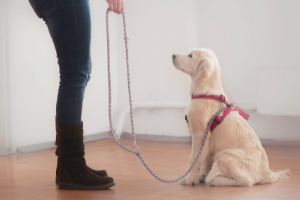It’s a hard concept to digest, but it’s been proven time and time again that dogs respond best to positive reinforcement over punishment – so get ready for extra praise, plenty of ear scratches, and a stockpile of treats if your dog needs training or has some behavioral corrections to make. We know that training a dog and, in particular, a puppy can be challenging and even frustrating but, as veterinarians, we also know that yelling and berating versus positive reinforcement is not going to work. And far too often we see dogs get rehomed because of behavior issues that result because of this. In fact, a recent VICE article on dog trainer Mark Patrick notes that there has been a frightening surge in severe behavior problems since the pandemic, as many owners didn’t take the time to socialize or properly train their dog before going back to work. To avoid this pitfall, read on to find out more about why positive reinforcement works and punishment doesn’t, and how to incorporate some simple dog training tips at home.
What is positive reinforcement?
Positive reinforcement means you avoid disciplining your dog when bad behaviors occur, and instead reward positive behaviors when they happen. This tells your dog they did well and increases the likelihood they will repeat the action.
Positive reinforcements can include:
- Excited praise
- Treats or even some kibble they enjoy
- Spontaneous playtime
- Long walks
- Car rides
Just be sure the positive reinforcement is given immediately following the positive behavior, so the dog associates the reward with their actions.
Benefits of Positive Reinforcement
There are many benefits to positive reinforcement, and some of them are as follows:
Positive Reinforcement Establishes Communication
Using positive reinforcement is the most effective way to communicate with your dog, unlike negative reinforcement which can result in your dog becoming fearful of you. Dogs are very eager to please their owners, and positive reinforcement lets them know their behavior was good and gives them a solid indication of how to keep making you happy. It leads to an eager dog that is easy to teach and wants to listen, knowing the correct behavior means a happy owner and a treat or activity they enjoy. Positive reinforcement teaches a dog to dislike the same behaviors you dislike, establishing a method of communication that works for you both.
Positive Reinforcement Strengthens Your Bond
Dog owners consider their dogs to be a friend and companion that is part of their family. The strategy of positive reinforcement helps reinforce that bond, providing your dog with a level of confidence and trust that isn’t easily achieved with other methods of training. Standard training methods with professional trainers might teach your dog how to behave and follow basic commands, but positive reinforcement by an owner leads to a strong relationship built on mutual understanding.
Positive Reinforcement Offers Mental Stimulation
A lesser-known fact about dogs is that boredom is a significant contributor to behavioral issues, with them acting out in ways such as digging or chewing objects other than their toys. Training with positive reinforcement keeps them engaged and their boredom at bay. Daily training sessions that work on their issues and result in play sessions, walks, and cuddles burn off energy and keep them occupied.
Positive Reinforcement Offers Consistency and Helps Develop Patience
Dogs are creatures of habit, and they don’t possess a great deal of patience. With positive reinforcement, everyone living in your household needs to be part of the process, handling the training the same way and offering the same positive reinforcements. Over time, this will be rewarded by your dog consistently exhibiting positive behaviors with everyone in the home, and they’ll learn patience since they trust and understand a reward is coming as long as they continue the good behavior.

Why Punishment Doesn’t Work in Dog Training
Punishment isn’t a very clear process for dogs, with them easily misconstruing what they’ve done wrong. For example, having an accident on the living room carpet which results in yelling and putting them in their crate might seem like the logical thing to do. However, that dog may interpret those consequences as meaning it’s not acceptable to eliminate in that particular spot, so they will start hiding their accidents in random places around the home. Punishment creates a communication issue, which positive reinforcement avoids. The proper thing to do in this scenario is to immediately take them outside and demonstrate that is the appropriate location for them to eliminate. When they do eliminate outside, reward and praise them.
Punishment can also be degrading to your dog, leaving them detached and unmotivated. Positive reinforcement is best demonstrated by relating it to a human-to-human relationship. If you make a mistake at work, physical aggressiveness or yelling by your boss leaves you feeling ashamed, degraded, and unmotivated. A more constructive conversation that addresses the root of the problem and a solution to avoid it from happening again leaves you feeling relieved, grateful, and motivated. Giving your dog negative versus positive reinforcement has the same results.
The American Kennel Club has some great tips for rewarding your dog when training, to ensure you’re maximizing the training experience and being as effective as possible. Of course, we’re happy to help as well, as the last thing we want to have happen is for you to have to rehome your dog due to behavior issues. Give us a call and we can talk you through some strategies or recommend a professional dog trainer.
